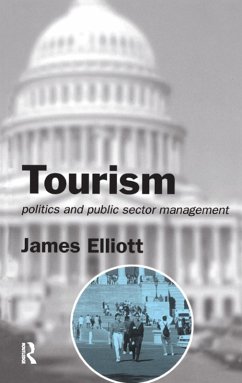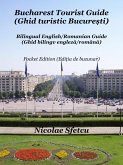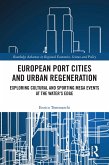51,95 €
51,95 €
inkl. MwSt.
Sofort per Download lieferbar

26 °P sammeln
51,95 €
Als Download kaufen

51,95 €
inkl. MwSt.
Sofort per Download lieferbar

26 °P sammeln
Jetzt verschenken
Alle Infos zum eBook verschenken
51,95 €
inkl. MwSt.
Sofort per Download lieferbar
Alle Infos zum eBook verschenken

26 °P sammeln
- Format: ePub
- Merkliste
- Auf die Merkliste
- Bewerten Bewerten
- Teilen
- Produkt teilen
- Produkterinnerung
- Produkterinnerung

Bitte loggen Sie sich zunächst in Ihr Kundenkonto ein oder registrieren Sie sich bei
bücher.de, um das eBook-Abo tolino select nutzen zu können.
Hier können Sie sich einloggen
Hier können Sie sich einloggen
Sie sind bereits eingeloggt. Klicken Sie auf 2. tolino select Abo, um fortzufahren.

Bitte loggen Sie sich zunächst in Ihr Kundenkonto ein oder registrieren Sie sich bei bücher.de, um das eBook-Abo tolino select nutzen zu können.
James Elliot examines the impact of tourism on developed and developing countries and the ways in which governments have managed this diverse and volatile industry. The issues are explored using a range of case studies from around the world.
- Geräte: eReader
- mit Kopierschutz
- eBook Hilfe
Andere Kunden interessierten sich auch für
![Tourism (eBook, PDF) Tourism (eBook, PDF)]() James ElliottTourism (eBook, PDF)51,95 €
James ElliottTourism (eBook, PDF)51,95 €![Bucharest Tourist Guide (Ghid turistic Bucure¿ti) Pocket Edition (Edi¿ia de buzunar) (eBook, ePUB) Bucharest Tourist Guide (Ghid turistic Bucure¿ti) Pocket Edition (Edi¿ia de buzunar) (eBook, ePUB)]() Nicolae SfetcuBucharest Tourist Guide (Ghid turistic Bucure¿ti) Pocket Edition (Edi¿ia de buzunar) (eBook, ePUB)3,99 €
Nicolae SfetcuBucharest Tourist Guide (Ghid turistic Bucure¿ti) Pocket Edition (Edi¿ia de buzunar) (eBook, ePUB)3,99 €![European Port Cities and Urban Regeneration (eBook, ePUB) European Port Cities and Urban Regeneration (eBook, ePUB)]() Enrico TommarchiEuropean Port Cities and Urban Regeneration (eBook, ePUB)43,95 €
Enrico TommarchiEuropean Port Cities and Urban Regeneration (eBook, ePUB)43,95 €- -18%11
![The Business of Tourism (eBook, ePUB) The Business of Tourism (eBook, ePUB)]() J. Christopher HollowayThe Business of Tourism (eBook, ePUB)55,95 €
J. Christopher HollowayThe Business of Tourism (eBook, ePUB)55,95 € - -18%11
![The Business of Tourism (eBook, ePUB) The Business of Tourism (eBook, ePUB)]() J. Christopher HollowayThe Business of Tourism (eBook, ePUB)55,95 €
J. Christopher HollowayThe Business of Tourism (eBook, ePUB)55,95 € ![The Tourism and Leisure Industry (eBook, ePUB) The Tourism and Leisure Industry (eBook, ePUB)]() Kaye Sung ChonThe Tourism and Leisure Industry (eBook, ePUB)30,95 €
Kaye Sung ChonThe Tourism and Leisure Industry (eBook, ePUB)30,95 €![Tourism Crises (eBook, ePUB) Tourism Crises (eBook, ePUB)]() Tourism Crises (eBook, ePUB)59,95 €
Tourism Crises (eBook, ePUB)59,95 €-
-
-
James Elliot examines the impact of tourism on developed and developing countries and the ways in which governments have managed this diverse and volatile industry. The issues are explored using a range of case studies from around the world.
Dieser Download kann aus rechtlichen Gründen nur mit Rechnungsadresse in A, B, BG, CY, CZ, D, DK, EW, E, FIN, F, GR, HR, H, IRL, I, LT, L, LR, M, NL, PL, P, R, S, SLO, SK ausgeliefert werden.
Produktdetails
- Produktdetails
- Verlag: Taylor & Francis eBooks
- Seitenzahl: 296
- Erscheinungstermin: 23. September 2020
- Englisch
- ISBN-13: 9781000158731
- Artikelnr.: 60149709
- Verlag: Taylor & Francis eBooks
- Seitenzahl: 296
- Erscheinungstermin: 23. September 2020
- Englisch
- ISBN-13: 9781000158731
- Artikelnr.: 60149709
- Herstellerkennzeichnung Die Herstellerinformationen sind derzeit nicht verfügbar.
James Elliott is a Senior Lecturer in Public Administration at the University of Queensland, Australia.
Series editor's preface
List of illustrations
Preface
Acknowledgements Acronyms and abbreviations
1 Introduction
The framework of why, who, how and what Why governments are involved in tourism
Who is involved in tourism management?
How managers manage
What results? practice and performance
A comparative approach
Five countries
Summary
Suggested reading
2 Why tourism?
Definitions
Historical reasons for government involvement in tourism
Economic reasons for government involvement in tourism
Summary
Suggested reading
3 Public sector management and tourism
Why: political environment and principles
Who: multiplicity and diversity
How: formal, informal and changes
Summary
Suggested reading
4 Management from the centre: formulation
Why: responsibilities, ideology and objectives
Who: leaders, ministries and organisations
How: process and initiatives, formal and informal
What results? practice and performance, United Kingdom
Summary
Suggested reading
5 Management from the centre: implementation
Why: implementation and difficulties
Who: federal, state and statutory organisations
How: power, finance, functions, problems and planning
What results? Thailand
Summary
Suggested reading
6 Management at the local level
Why: representation, responsibilities, ideology and objectives
Who: representatives, managers and industry
How: leadership, community, power and principles
What results? England, Australia, Thailand
Summary
Suggested reading
7 Public management and the private sector
Why: responsibility, mutual importance
Who: the industry, government business enterprises
How: politics, freedom, dependency, regional boards
What results? air travel, incentive travel
Summary
Suggested reading
8 Management of tourism control
Why control? principles
Who is involved?
How to control: formal and informal
What results? Vietnam, environment
Summary
Suggested reading
9 Conclusions ... and the future?
Principles and practice
How managers manage
The results
Practice
Performance
The future of tourism
The future of the PSM of tourism
Bibliography
Index
Authors cited.
List of illustrations
Preface
Acknowledgements Acronyms and abbreviations
1 Introduction
The framework of why, who, how and what Why governments are involved in tourism
Who is involved in tourism management?
How managers manage
What results? practice and performance
A comparative approach
Five countries
Summary
Suggested reading
2 Why tourism?
Definitions
Historical reasons for government involvement in tourism
Economic reasons for government involvement in tourism
Summary
Suggested reading
3 Public sector management and tourism
Why: political environment and principles
Who: multiplicity and diversity
How: formal, informal and changes
Summary
Suggested reading
4 Management from the centre: formulation
Why: responsibilities, ideology and objectives
Who: leaders, ministries and organisations
How: process and initiatives, formal and informal
What results? practice and performance, United Kingdom
Summary
Suggested reading
5 Management from the centre: implementation
Why: implementation and difficulties
Who: federal, state and statutory organisations
How: power, finance, functions, problems and planning
What results? Thailand
Summary
Suggested reading
6 Management at the local level
Why: representation, responsibilities, ideology and objectives
Who: representatives, managers and industry
How: leadership, community, power and principles
What results? England, Australia, Thailand
Summary
Suggested reading
7 Public management and the private sector
Why: responsibility, mutual importance
Who: the industry, government business enterprises
How: politics, freedom, dependency, regional boards
What results? air travel, incentive travel
Summary
Suggested reading
8 Management of tourism control
Why control? principles
Who is involved?
How to control: formal and informal
What results? Vietnam, environment
Summary
Suggested reading
9 Conclusions ... and the future?
Principles and practice
How managers manage
The results
Practice
Performance
The future of tourism
The future of the PSM of tourism
Bibliography
Index
Authors cited.
Series editor's preface
List of illustrations
Preface
Acknowledgements Acronyms and abbreviations
1 Introduction
The framework of why, who, how and what Why governments are involved in tourism
Who is involved in tourism management?
How managers manage
What results? practice and performance
A comparative approach
Five countries
Summary
Suggested reading
2 Why tourism?
Definitions
Historical reasons for government involvement in tourism
Economic reasons for government involvement in tourism
Summary
Suggested reading
3 Public sector management and tourism
Why: political environment and principles
Who: multiplicity and diversity
How: formal, informal and changes
Summary
Suggested reading
4 Management from the centre: formulation
Why: responsibilities, ideology and objectives
Who: leaders, ministries and organisations
How: process and initiatives, formal and informal
What results? practice and performance, United Kingdom
Summary
Suggested reading
5 Management from the centre: implementation
Why: implementation and difficulties
Who: federal, state and statutory organisations
How: power, finance, functions, problems and planning
What results? Thailand
Summary
Suggested reading
6 Management at the local level
Why: representation, responsibilities, ideology and objectives
Who: representatives, managers and industry
How: leadership, community, power and principles
What results? England, Australia, Thailand
Summary
Suggested reading
7 Public management and the private sector
Why: responsibility, mutual importance
Who: the industry, government business enterprises
How: politics, freedom, dependency, regional boards
What results? air travel, incentive travel
Summary
Suggested reading
8 Management of tourism control
Why control? principles
Who is involved?
How to control: formal and informal
What results? Vietnam, environment
Summary
Suggested reading
9 Conclusions ... and the future?
Principles and practice
How managers manage
The results
Practice
Performance
The future of tourism
The future of the PSM of tourism
Bibliography
Index
Authors cited.
List of illustrations
Preface
Acknowledgements Acronyms and abbreviations
1 Introduction
The framework of why, who, how and what Why governments are involved in tourism
Who is involved in tourism management?
How managers manage
What results? practice and performance
A comparative approach
Five countries
Summary
Suggested reading
2 Why tourism?
Definitions
Historical reasons for government involvement in tourism
Economic reasons for government involvement in tourism
Summary
Suggested reading
3 Public sector management and tourism
Why: political environment and principles
Who: multiplicity and diversity
How: formal, informal and changes
Summary
Suggested reading
4 Management from the centre: formulation
Why: responsibilities, ideology and objectives
Who: leaders, ministries and organisations
How: process and initiatives, formal and informal
What results? practice and performance, United Kingdom
Summary
Suggested reading
5 Management from the centre: implementation
Why: implementation and difficulties
Who: federal, state and statutory organisations
How: power, finance, functions, problems and planning
What results? Thailand
Summary
Suggested reading
6 Management at the local level
Why: representation, responsibilities, ideology and objectives
Who: representatives, managers and industry
How: leadership, community, power and principles
What results? England, Australia, Thailand
Summary
Suggested reading
7 Public management and the private sector
Why: responsibility, mutual importance
Who: the industry, government business enterprises
How: politics, freedom, dependency, regional boards
What results? air travel, incentive travel
Summary
Suggested reading
8 Management of tourism control
Why control? principles
Who is involved?
How to control: formal and informal
What results? Vietnam, environment
Summary
Suggested reading
9 Conclusions ... and the future?
Principles and practice
How managers manage
The results
Practice
Performance
The future of tourism
The future of the PSM of tourism
Bibliography
Index
Authors cited.







